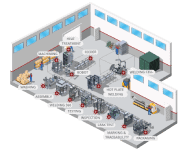Automation in the Manufacturing Industry: Transforming Production Processes
Automation in the manufacturing industry has revolutionized how products are designed, assembled, and delivered. From streamlining repetitive tasks to ensuring precision in production, automation systems are at the heart of modern manufacturing facilities. By leveraging automated assembly machines, robotic systems, and manufacturing test systems, companies can improve efficiency, reduce costs, and maintain competitive advantages in an evolving market.
The Role of Automation Systems in Manufacturing
At its core, manufacturing automation integrates advanced technologies into production processes to reduce human intervention while increasing accuracy and speed. Automation systems and cells, such as automation equipment, factory automation equipment, and automated manufacturing cells, play a vital role in achieving these goals. These systems are tailored to specific manufacturing needs, ensuring seamless integration into existing workflows.
For instance, automated assembly machines and automatic assembly machines are widely used in industries like electronics and automotive. These machines can handle repetitive tasks such as assembling small components with unparalleled precision. By incorporating custom automated machines, manufacturers can design equipment that meets unique production requirements, enhancing flexibility and productivity.
Examples of Automated Manufacturing Solutions
1. Automated Assembly and Robotic Systems
Manufacturers frequently rely on robotic work cells and robotic handling systems for tasks that require consistency and precision. In the automotive sector, robotcells and robotcels are used for assembling complex components like engines and transmissions. These systems ensure accuracy while significantly reducing production time.
In consumer goods, materials handling robots streamline the movement of parts across assembly lines, minimizing downtime and improving workflow efficiency. Similarly, robotic screw fastening systems are ideal for securely assembling products with intricate designs.
2. Welding Automation Systems
Welding is a critical process in industries like automotive, construction, and aerospace. Welding automation systems and welding automation equipment ensure strong, consistent welds, reducing the risk of defects. For example, a weld automation system can be programmed to join components with exact specifications, improving structural integrity and safety.
3. Testing and Quality Control
Ensuring product quality is essential in any manufacturing process. This is where manufacturing test systems and automated leak testing solutions come into play. These systems validate key parameters such as dimensions, alignment, and functionality. For example, an automated measuring station might check the concentricity and height of mechanical parts, while a leak detection process ensures airtight seals in automotive or aerospace components.
Contact AMD today!
The Benefits of Automation in Manufacturing
Implementing automation brings several advantages, including:
- Increased Efficiency: Automated systems like assembly line machines and equipment automation speed up production processes, allowing manufacturers to meet high-volume demands.
- Enhanced Quality: By eliminating human error, systems such as automated manufacturing equipment and traceability marking deliver consistent results, ensuring that every product meets stringent quality standards.
- Cost Savings: Although the initial investment in automation machinery and industrial automation equipment can be high, the long-term savings in labor and waste reduction outweigh the costs.
- Improved Safety: Automation reduces the need for human workers to perform hazardous tasks, with technologies like robot work cells and automated welding services taking on these responsibilities.
Automation in the Automotive Industry
The automotive industry has been a pioneer in adopting automation, utilizing advanced systems to optimize production. Automotive automation systems, for example, streamline the assembly of electric motor components, such as the motor rotor stator, ensuring precision and efficiency. Additionally, traceability marking solutions enable manufacturers to track components throughout the supply chain, ensuring accountability and quality control.
Custom Solutions for Unique Challenges
One of the key advantages of automation is its adaptability. Manufacturers can invest in custom assembly machines or custom automated machines to address specific challenges. For example, a manufacturer of medical devices may require a system that performs precise assembly and thorough testing to meet regulatory standards. In contrast, a company producing construction materials might need automation welding systems for heavy-duty tasks.
The Future of Manufacturing Automation
As technology advances, the capabilities of automation systems will continue to grow. Emerging trends such as AI-powered manufacturing automation equipment and IoT-enabled automated cells are set to redefine the industry. These innovations will allow manufacturers to predict maintenance needs, optimize workflows, and achieve even greater levels of precision.
In conclusion, automation in the manufacturing industry is not just a trend but a necessity for businesses looking to remain competitive. Whether through automated assembly equipment, welding automation systems, or production testing systems, automation enables manufacturers to produce high-quality products efficiently and cost-effectively. Investing in advanced factory automation equipment today paves the way for a more innovative and productive tomorrow.



